Choosing Between Common Types of Tulips
Beloved around the world for their elegant form and vibrant petals, tulips mark the arrival of spring and can make stunning additions to any garden.
With over 3000 tulip varieties, these versatile flowers can be planted in flower beds, borders, containers, or even naturalised in meadows, providing flexibility for anyone hoping to incorporate them into their garden. When bloom type, optimal growth conditions and purpose are considered, there is a tulip variety to brighten any garden.
Common Factors Between Tulip Species
Tulips are a perennial herbaceous bulbiferous flower belonging to the genus Tulipa, which is part of the Liliaceae family. They are renowned for their cup-shaped blooms that sit atop a single green stem.
Tulips possess lance-shaped tepals rather than distinct petals and sepals (the outermost, leaf-like structure of a flower). This unique adaptation is responsible for their iconic symmetrical appearance.
Choosing Between Different Varieties of Tulips
When choosing between the different types of tulips, there are some main considerations to take into account. Being mindful of which tulip variety you choose can help you pick a bloom that will best benefit your garden.
Environment
Most tulip varieties grow better in cooler climate conditions but certain types will handle a warmer winter. It’s best to position your tulips in full sun to partial shade, in slightly acidic to neutral soil.
Bloom Aesthetic
Different species of tulips possess different bloom characteristics, including both colour and form. It is important to consider the atmosphere the petals may create. For example, fringed petal varieties lend themselves to a sense of whimsy and romance, whilst harsher pointed blooms are ideal for creating bold displays.
Purpose
Some varieties will naturally lend themselves to different purposes, whether your goal is to plant a tulip that can border your garden bed or produce a bloom that can readily naturalise.
Common Tulips and Their Advantages
The Bold Choice: Parrot Tulips
Parrot tulips can instantly create an exotic and striking statement in the garden with their large, bi-coloured and frilled petals. These tulips are best suited to cooler climates, and typically bloom in mid to late spring offering a burst of colour and texture when many other spring flowers are still emerging. For the most stunning results, plant parrot tulips in a triangular shape to create a bouquet effect in your garden.
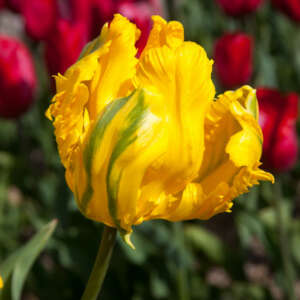
Tulip Jan Van Nes Parrot – Garden Express Australia
The Hardy Choice: Darwin Hybrid Tulips
More classic in bloom appearance, Darwin hybrid tulips sit atop sturdy green stems and are known for their longevity and reliability. They can withstand adverse weather conditions and are well-suited for naturalising, maintaining their elegant appearance after multiple seasons.
Darwin hybrid tulips are adaptable to a wide range of climates, including cooler regions, and typically bloom in mid to late spring. Reaching heights of 20–40 cm, these tulips are excellent choices for mass plantings, flower beds, and borders.

Growing Guide – Garden Express Australia
The Warmer Climate Choice: Single Late Tulips
Single late tulips do not require as cool of a winter as many other varieties, making them a popular choice in warmer climates. With their elegant almond-shaped blooms and tall stems, they are perfect as a cut flower.
Single late tulips come in a wide variety of vibrant colours, making them ideal for creating harmonious colour schemes in the garden bed. One of the main advantages of single late tulips is their late blooming period, which can help extend the tulip season well into the end of spring.

Tulip Single Late Collection – Garden Express Australia
The Versatile Choice: Triumph Tulips
Triumph tulips can come in a variety of petal shapes and hues, characterised by their hardiness and resilience rather than their bloom’s appearance. One of the main advantages of triumph tulips is their ability to thrive in various growing conditions, including different climates and soil types.
Triumph tulips are smaller than many other varieties with compact leaves and short stems. This makes them ideal for pot planting, creating vertical depth in your garden or as a vibrant spring colour hedge.
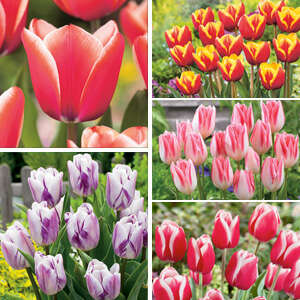
Tulip Triumph Bi Colour Collection – Garden Express Australia
The Romantic Choice: Double Tulips
Like the name suggests, this breath-taking tulip variety is known for having a larger number of petals than other types. Their lush, peony-like petals give the bloom a delicate appearance, despite the flower’s overall hardiness.
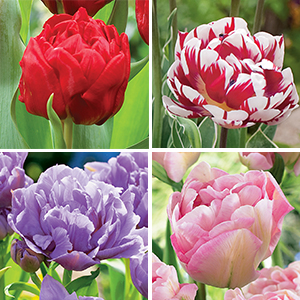
Tulip Double Collection – Garden Express Australia
With their textured appearance and long-lasting blooms, double tulips are perfect for creating elegant floral arrangements and adding a touch of romance to garden beds, borders, and containers.
The Textured Choice: Fringed Tulips
Fringed tulips are characterised by their finely incised petals, which give their blooms a unique and delicate appearance. They are perfect for adding a touch of interest and whimsy to your garden, and are beautiful when blooming en masse.

Garden Express Australia
They can be used as focal points in gardens or borders, where their distinctive blooms draw attention and create visual interest. Additionally, planting this charming flower close to other tulip varieties can help create bold and contrasting floral displays.
The Unique Choice: Lily Tulips
This tulip variety is known for its pointed and slender petals that delicately arch outward, like the blooms of a lily. Due to their unique form and tall stems, lily tulips are best paired beside more traditional shapes to create interest in the garden bed.
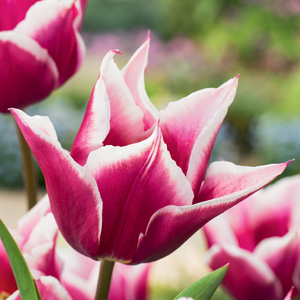
Tulip Claudia- Pre-Order – Garden Express Australia
The Variety Choice: Tulip Mixes
Tulip mixes are perfect for gardeners who prefer a diverse and eclectic display of tulips. They provide a variety of colours, shapes, and bloom times, ensuring continuous visual appeal throughout the spring season.

Tulip Regular Mixed – Pre-Order – Garden Express Australia
If you would like to add charm and whimsy to your garden without the irregularity of tulip mixes, you can also consider browsing Garden Express’ large variety of novelty tulips.
Find the Perfect Tulip
Planting tulips in your garden can be incredibly rewarding, helping you celebrate the beginning of spring with a stunning display of colours and shapes. Keeping in mind the purpose and aesthetic of your garden, there is sure to be a tulip variety that is perfect for you. Ready to add a splash of colour and elegance to your garden? Browse Garden Express’ broad range of tulip varieties online today.
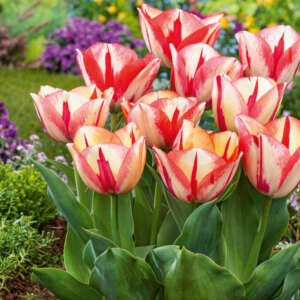
Tulip Spryng Break – Garden Express Australia
FAQ
- What should I consider when choosing a tulip variety?
Considerations include the tulip’s preferred environment, bloom aesthetic (colour and form), and purpose (e.g., bordering gardens, naturalising). Each variety offers unique advantages, so it is best to select one that aligns with your needs.
- How do I choose the right tulip variety for my garden’s climate?
Identify your climate zone and select tulip varieties that are known to thrive in that zone. Cooler climates suit most tulips, but for warmer areas, consider varieties like Single Late Tulips that require less chilling time.
- Can I plant different tulip varieties together?
Yes, planting different varieties together can create a stunning display with varied bloom times, heights, and colours. Consider combining early, mid, and late-blooming tulips to extend the blooming period in your garden.
- What are the best tulips for shady areas?
While most tulips prefer full sun to partial shade, certain varieties may tolerate more shade. It’s essential to ensure that even in shaded areas, tulips receive some direct sunlight throughout the day. For specific varieties, contact the friendly team at Garden Express about tulips that have shown resilience in shaded conditions in your area.
- What tulip varieties are best for bold, architectural garden features?
Lily-flowered tulips and parrot tulips offer unique shapes and textures that can serve as bold, architectural features in a garden. Their distinctive blooms can create focal points and add an artistic touch to the landscape.
Ready to find your perfect tulip match? Browse Garden Express’ extensive range of tulip varieties and start planting today!







Comments are closed.